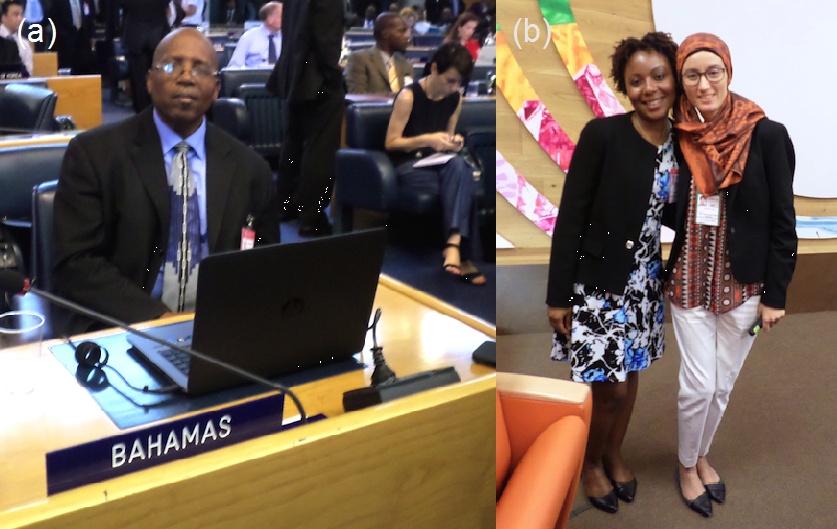
(Left): Edison Deleveaux, Deputy Director of Marine Resources, Ministry of Agriculture and Marine Resources, The Bahamas, attending COFI 32. (Right): Nicola Smith and Dyhia Belhabib at COFI 32 side event (b).
By Nicola Smith
I attended the FAO 32nd session of the Committee on Fisheries (COFI) as a part of the official Bahamas delegation on 11th – 15th July 2016 in Rome, Italy. Edison Deleveaux, deputy director of Fisheries, Ministry of Agriculture and Marine Resources in The Bahamas, accompanied me as part of the delegation. The trip was made possible due to the generosity of the Sea Around Us at the University of British Columbia. Dyhia Belhabib from the Sea Around Us and Angela Bednarek from The Pew Charitable Trusts joined Mr. Deleveaux and I in Rome for COFI 32 and coordinated our stay while there. In addition to attending the COFI meeting, I presented key findings from The Bahamas fisheries catch reconstruction study (1950-2010), conducted by Dirk Zeller and I and published in the January 2016 issue of Fishery Bulletin, at the COFI 32 side event entitled, “Reliable fishery statistics and importance for food security assessments”.
Attending COFI 32 was significant for The Bahamas for three main reasons. First, and most important, this was the first time that a delegation from The Bahamas has had the opportunity to attend COFI. Second, as an official spokesperson for the government of The Bahamas, Edison Deleveaux made a country statement on the floor of COFI on 11th July 2016 that specifically addressed the need to improve catch data collection and reporting in The Bahamas. In his statement, Mr. Deleveaux mentioned that The Bahamas was implementing a new, improved fisheries data collection system with assistance from the FAO. This new system accounts for catches from the subsistence fishery for the first time and improves upon reporting of catches from the small-scale artisanal fishery. Moreover, Mr. Deleveaux highlighted in his statement that although this new data collection system is promising, it still does not account for catches from the recreational fishery in The Bahamas, which a catch reconstruction study conducted in collaboration with the Sea Around Us showed to be substantial. This latter point about unreported catches from the recreational fishery is important, and was the focus of my presentation during the COFI 32 side event the following day on 12th July 2016. Third, during COFI, Mr. Deleveaux and I were able to speak with Milton Haughton, executive director of the Caribbean Regional Fisheries Mechanism Secretariat, and Mark Williams, director of the Marine Resources Department in St. Kitts and Nevis, to coordinate country statements on the floor of COFI 32 about the impacts of climate change on fisheries in the Caribbean, which are already being felt.
The side event at COFI 32 on fishery statistics was a huge success. The event was organized by the FAO and co-sponsored by The Pew Charitable Trusts and the governments of The Gambia and The Bahamas. The event was held on 12th July 2016 at 12h30 to 14h00 in the Ethiopia room of the FAO, and consisted of several presentations followed by a panel discussion that was moderated by Fred Kingston, executive secretary of the Northwest Atlantic Fisheries Organization. Dyhia Belhabib gave a presentation on “Catch reconstructions: approach, results and implications in a data poor context” while I presented on “The ‘other’ half of the story: unreported catch data for The Bahamas”. National representatives from The Gambia, Cameroun and Senegal also gave presentations in addition to Manuel Barange, director of Fisheries and Aquaculture Division at FAO, who presented on “FAO’s approach to improvement of statistics for securing small-scale fisheries”. There were approximately 50 people in the attendance, including Edison Deleveaux from The Bahamas delegation.
My presentation was well received at the side event. I emphasized the importance and magnitude of catches from the recreational fishery in The Bahamas – recreational fishing accounted for 55% of total reconstructed catches from 1950 through 2010 – and the need to report catches from this sector, which is closely linked to tourism in small island states. Several people, including FAO staff members and various country delegates, approached me after my presentation to congratulate me on a great talk and to state that they had not realized the importance of recreational fisheries and its strong ties to tourism. Some people such as Philippe Michaud, president of the Seychelles Fishing Authority, Ministère des Finances, du Commerce et de l’Économie Bleue, also expressed that there were several similarities between their own countries and The Bahamas in terms of the close linkage between tourism and recreational fisheries. Philippe Michaud also raised the point that there is a need to conduct an economic valuation of recreational fisheries in small island states dependent on tourism.
The greatest success of the side event, from my perspective, was when the FAO acknowledged the validity of reconstructed catch data for The Bahamas. Specifically, during the panel discussion, Luca Garibaldi stated that the FAO was willing to accept all of the reconstructed catch data for The Bahamas, particularly the recreational catch data, provided that The Bahamas government officially endorses the reconstructed catch data and retroactively submits it to the FAO. Mr. Garibaldi also expressed the need for The Bahamas catch reconstruction to be updated to 2015.

